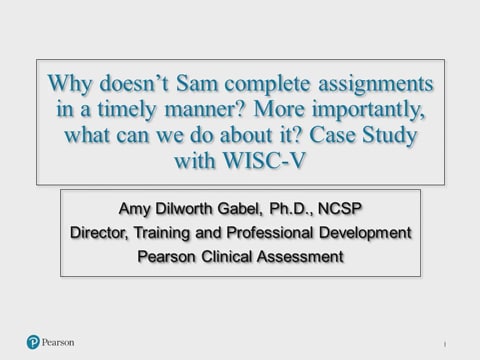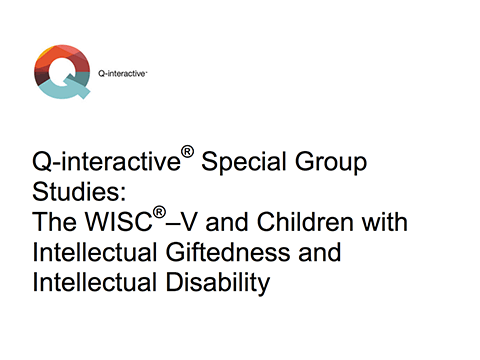Cognitive function & school achievement
Strength is found where challenges and opportunities meet
It’s a well-known fact that early detection of cognitive functioning challenges leads to increased success in the classroom, but when is the right time to test and what methods should you use? We're here to help you choose the best cognitive assessment for each child and guide you as you identify their unique strengths to improve their intervention efficacy.
Other resources
Cognitive ability has been shown to be a good predictor of academic success and many outcomes. Your clients trust you to have the proper tools to help them reach their goals. Take some time to explore these pertinent case studies, articles, and videos to help you help them improve their cognitive skills and reach their fullest potential.

Why Doesn't Sam Complete Assignments in a Timely Manner? More Importantly, What Can We Do About It?
This webinar uses a case study to examine how the WISC-V can be used as part of a comprehensive assessment to understand why some children experience difficulty completing assignments in a timely manner.

Q-interactive® Special Group Studies: The WISC®–V and Children with Intellectual Giftedness and Intellectual Disability
Learn how WISC®-V and Q-interactive make assessing a child’s giftedness or intellectual disability easier and more accurate than ever.
WPPSI™ - IV-CDN
Measures cognitive development for preschoolers and young children.
WISC®-V-CDN
Measure a child's intellectual ability. Administration time for the core subtests takes about 60 minutes.
WAIS®-IV-CDN
The most advanced measure of cognitive ability and results you can trust for ages 16-90.
WASI®-II
The WASI–II, a revision of the WASI, provides a brief, reliable measure of cognitive ability for use in clinical, educational, and research settings.
KABC™-II NU
A culturally fair ability test for all the children you serve. An individually administered measure of cognitive ability. Administration time ranges from 25-70 minutes.
KBIT™-2 Revised
Professionals depend on the Kaufman Brief Intelligence Test (K-BIT) to measure both verbal and nonverbal ability. Administration time is approximately 20 minutes.
WRAT5
Assess and monitor reading, spelling, and math skills and help identify possible learning disabilities.
WNV-CDN
Nonverbal measure of ability for culturally and linguistically-diverse groups. Administration time for the full battery is 45 minutes. Brief version 15-20 minutes.
RAVEN'S 2
Assesses nonverbal abilities at three levels. Administration time ranges from 15-30 minutes.
NEW: WIAT®-4–CDN
Updated achievement test for use in a variety of clinical, educational, and research settings. Administration time depends on grade level.
KTEA™-3
Individually administered battery that provides in-depth assessment of key academic skills. Administration time ranges from 15-85 minutes.
KTEA™-3 Brief
Brief, individually administered measure of achievement in reading, math, and written expression.
WRIT
The WRIT provides a general measure of intelligence (IQ) with user-friendly materials that make administration simple. Administration time is 20-30 minutes.
Differential Ability Scales®-II
Assesses cognitive ability in school aged children. Administration time ranges from 15-30 minutes.
DASH
Help identify children with handwriting difficulties and provides relevant information for intervention planning.
